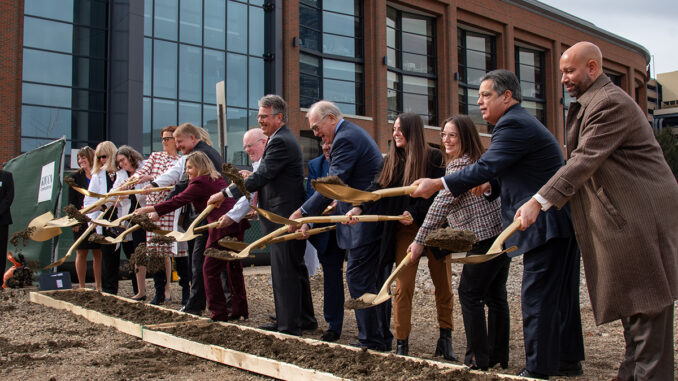
by Zoe Stratos | opinions editor
March 3, 2022
Duquesne’s proposed College of Osteopathic Medicine broke ground on the morning of March 1, advancing the mission of university founders to provide healthcare and address the needs of people in the Pittsburgh region.
The idea of “breaking ground” was literal and metaphoric during the ceremony, as sponsors, county officials, the Rev. Bill Christie, proposed dean John Kauffman and others joined President Ken Gormley in grabbing golden shovels and digging up dirt at the site on Forbes Avenue. This moment signified the start of construction.
“Today we advanced the historic mission of our university’s Spiritan founders to walk with and to understand the needs of our neighbors and community members, and to do whatever it takes to make a meaningful difference in their lives,” Gormley said at the site.
The College of Osteopathic Medicine (COM) will be the fifth health-focused school at the university, training students on campus and with local healthcare institutions to receive a Doctor of Osteopathic Medicine degree, or a D.O.
Expected to open in 2024, the school will enroll 85 students, planning to grow to 170 by 2026. But as of now, the university is excited to see an old mission finally take off.
After uncovering historical documents, it was discovered that the Rev. Martin Hehir, the president of the Pittsburgh Catholic College in 1910 — now known as Duquesne University — took steps to build both a law and medical school.
“The law school got off the ground in 1911, but the medical school was vetoed by a powerful entity in the city of that time, and never did take root,” Gormley said at the ceremony. “I like to tell my leadership team ‘it may be 110 years later folks, but we’re getting the job done.’”
The $151 million project, announced in July 2019, is projected to take two years. Many partners contributed to the school as an instrumental piece leading up to the day, including the Allegheny Foundation, the Heinz Endowments, the Henry L. Hillman Foundation, the Richard King Mellon Foundation and more.
Although a long time dream of the university, the current goal of the COM is to help fill the shortage of primary-care physicians locally and beyond, as the pandemic only increased the need for new physicians — and the college. Gormley emphasized this point, saying that “if there ever was a right time…it is right now.”
The Richard King Mellon Foundation was one of the first philanthropic organizations to dig into the development of the COM. Sam Reiman, the director of the foundation, emphasized the need for such a school.
“In 2020, the Association of American Medical Colleges projected that the U.S. would see a shortage of more than 55,000 primary care physicians by 2023,” Reiman said. “The School of Osteopathic Medicine will mean more primary care physicians in our communities that need them most, both in urban and rural settings. And it will mean more diverse primary care physicians in our communities, which data also shows will have a meaningful impact on health outcomes.”
Kauffman spoke of his excitement to have the support from their donors and partners through the different stages of the school’s development. The COM recently achieved “candidate status” from the Commission on Osteopathic College Accreditation in January.
“This is indeed a great day, and a turn toward the future when everything we have worked for will begin to show up in steel and glass,” Kauffman said.
Soon after the meeting, officials and administration walked across the road from the UPMC Cooper Fieldhouse. Christie offered a blessing upon the building site, and soon the 14 shovels hit the surface.
“Opening this College of Osteopathic Medicine, committed to health care equity and addressing all of the social determinants of health, is the most significant and ambitious undertaking in this university’s history, and it’s a tangible expression of what the Duquesne community can do today to carry out its mission while we also serve our region” Gormley said. “The curriculum will be developed not only to help them achieve excellence in the medical field, but also empower them to practice in ways that address healthcare inequity, both in urban and rural communities.”




